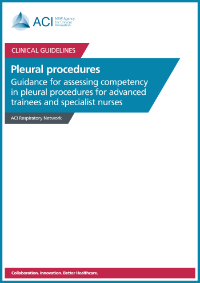Guidance for assessing competency in pleural procedures for advanced trainees and specialist nurses
In this section
Foreword
Pleural procedures that involve the insertion of intercostal catheters into the pleural cavity incur a high risk of adverse outcomes, including death. A review of 185 adverse incidents related to pleural drains in NSW in 2010-11 found that the majority (69%) were attributable to suboptimal clinical management. Incidents related to pleural drains occurred in both metropolitan and regional facilities, and within diverse settings including operating theatres, critical care units, emergency departments, specialised surgical and medical wards, general wards and medical imaging departments.
The Guidance for assessing competency in pleural procedures for advanced trainees and specialist nurses resource has been developed by members of the ACI Pleural Procedures Education Group, made up of respiratory physicians, respiratory nurses and managers from metropolitan and regional facilities across NSW.
The aim of the resource is to reduce the risks associated with pleural procedures in adults within all NSW hospitals. The resource defines a consistent standard for education, training and assessment of procedural and clinical skills. It applies to designated medical and nursing staff across clinical streams who are responsible for the insertion of pleural drains and care of adult patients with a pleural drain.
This resource is intended to be used in conjunction with ACI Pleural drains in adults: a consensus guideline. The resource is available online for local health districts, special health networks and clinical streams to review, adopt and endorse as per local requirements. Implementation of the recommendations will need to be tailored to align with the specific casemix and workforce as determined by local clinical streams and managers.
